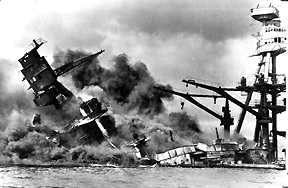Michael Fumento
Factual · Powerful · Original · Iconoclastic
The Guns of Vieques
January 01, 2001 · Michael Fumento · National Review · MilitaryYou could think of other reasons for putting Al Sharpton in prison — but he was put there on May 23 for illegal actions in a cause concerning the U.S. Navy and Puerto Rico. This has become a very, very trendy political cause.

Though you wouldn’t know it from news reports, Vieques is considered a tourist paradise.
New York’s big Rev. is one of a large cadre of politicians piling onto the bandwagon against the Navy’s gunnery facility on the island of Vieques. A group of House members has written to President Bush protesting the Navy’s use of Vieques, suggesting that because of the Navy’s occasional bombing and shellfire, the island has higher rates of death and cancer than the rest of Puerto Rico.
Some accuse the Navy exercises of increasing the infant-mortality rate; others allege that the sounds of blasting have prompted an epidemic of thickened heart membranes, labeled "vibroacoustic disease." A 31-year-old man even told a credulous Associated Press reporter that the bombing and shelling were making him bald. The hair "fell out little by little," said the anguished fellow.
Politicians have taken these charges very seriously; virtually everybody with more than five constituents of Puerto Rican descent has demanded that the Navy get out of Vieques. The list of Vieques foes now includes New York governor George Pataki, Mayor Rudolph Giuliani, and Sen. Hillary Clinton.

An examination of the facts reveals that the complaints of the anti-Vieques campaign are utter nonsense. To begin with, the Vieques inhabitants closest to the gunnery site live about nine miles away. Furthermore, Vieques residents differ demographically from those of the rest of Puerto Rico.
One prominent Vieques activist testified before Congress that Vieques suffers "a high incidence of alcoholism, drug abuse, and HIV infections." It has a high percentage of retirees, but no hospital for its 9,400 residents. These factors are probably of some import when it comes to health comparisons between Vieques and the mainland.
Nobody has been able to come up with a serious theory connecting any of the supposed illnesses with the gunnery site — which is not surprising, because the spooky claims amount to nothing more than misinformation and outright fabrication.
For example, the claim of environmentalist attorney Robert F. Kennedy Jr. that "Vieques has the highest rate of infant mortality and cancer in Puerto Rico" is widely accepted — but totally false.
The infant-mortality myth originated in February 2000, when the Puerto Rico Physicians and Surgeons Association held a press conference to claim that the rate was more than 50 percent higher on Vieques than in mainland Puerto Rico. They presented their conclusions to the Puerto Rico Health Department; the very next day, Puerto Rico health secretary Dr. Carmen Feliciano publicly refuted the allegations, and accused the Physicians and Surgeons Association of "lying to the public."
How so? They had neatly clipped out the years 1996 through 1998 from their statistics. With those years left in, the infant-mortality rate in Vieques is actually lower than that of mainland Puerto Rico.
What about the allegations that the overall death and cancer rates are higher in Vieques than in mainland Puerto Rico? The death rate hardly means anything, if you consider that 47 of the 50 states also have higher mortality rates than mainland Puerto Rico. As for the high cancer rate, it comes from data compiled by Dr. Diego Zavala of the Puerto Rico Cancer Registry in 1997 — which data actually show that the annual cancer rates on Vieques have been alternately both higher and lower than those of mainland Puerto Rico over the past several decades. The data bounce around because the Vieques population is so low that each cancer case makes a big statistical impact; the activists merely picked the year that best served their cause. In any case, the reported cancer rate on Vieques is actually much lower than that of many major U.S. cities.

Another victim of the mysterious Vieques syndrome
Finally, what of that strange "vibroacoustic" heart malady? Dr. Nuno Castelo Branco claimed to have found heart-membrane thickening among Portuguese aircraft-factory workers exposed to as much as ten years of constant jet-engine noise. Even if that particular claim stands up, it rather stretches the imagination to think that the thump of shell explosions nine miles away would have a similar effect; yet now Branco claims that among 50 Vieques residents he tested, 49 have this syndrome.
The federal government asked the Johns Hopkins University School of Hygiene and Public Health to look at Branco’s report. The Johns Hopkins team concluded that "within the constraint of the data available, no inference can be made as to the role of noise from naval gunfire in producing echocardiographic abnormalities" and that there is "insufficient basis for reaching a conclusion that Vieques residents have pericardial thickening or other heart abnormalities." Indeed, they called into question whether Branco’s finding supported the very existence of "vibroacoustic disease."

The USS Arizona: An icon of naval unpreparedness.
So much for the health problems. Are Puerto Ricans being exploited in some other way? Nope. According to the Navy, Vieques is one of 56 Defense Department live-fire ranges, and many Americans live far closer to gunnery facilities. Ft. Sill, Okla., for example, is less than two miles from a gunnery range — and Oklahomans, unlike Puerto Ricans, pay federal income taxes.
A special 1999 Defense Department panel reported to President Clinton that, for many reasons, Vieques is unique and vital to national defense. The panel reviewed a Navy study of the feasibility of 18 alternative areas, but concluded that "there are no potential sites that can meet the current stated requirement for combined arms live fire training."
And, although a third of the island’s population has lined up to be compensated for alleged medical ills, Heritage Foundation defense expert Jack Spencer notes that protests consistently comprise 200 people, or fewer. "Of these, less than ten percent at best are Vieques natives," he said. "If the locals were so concerned, you’d think they’d find a few hours of time to protest for themselves."
All of this should give us pause before we sacrifice national security to prevent the scourge of male pattern baldness.
